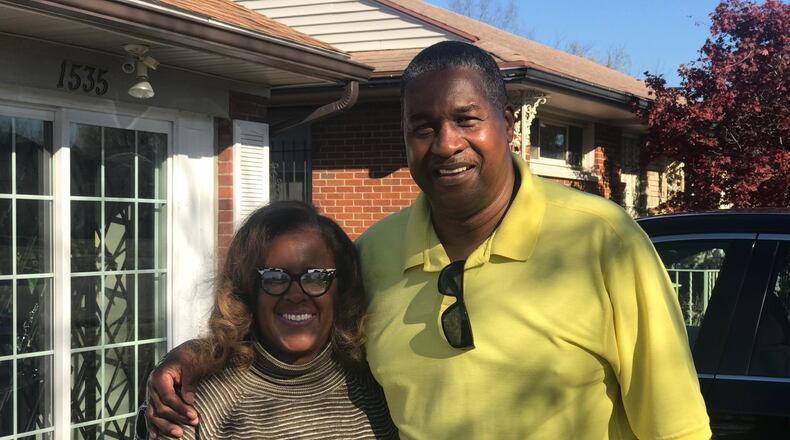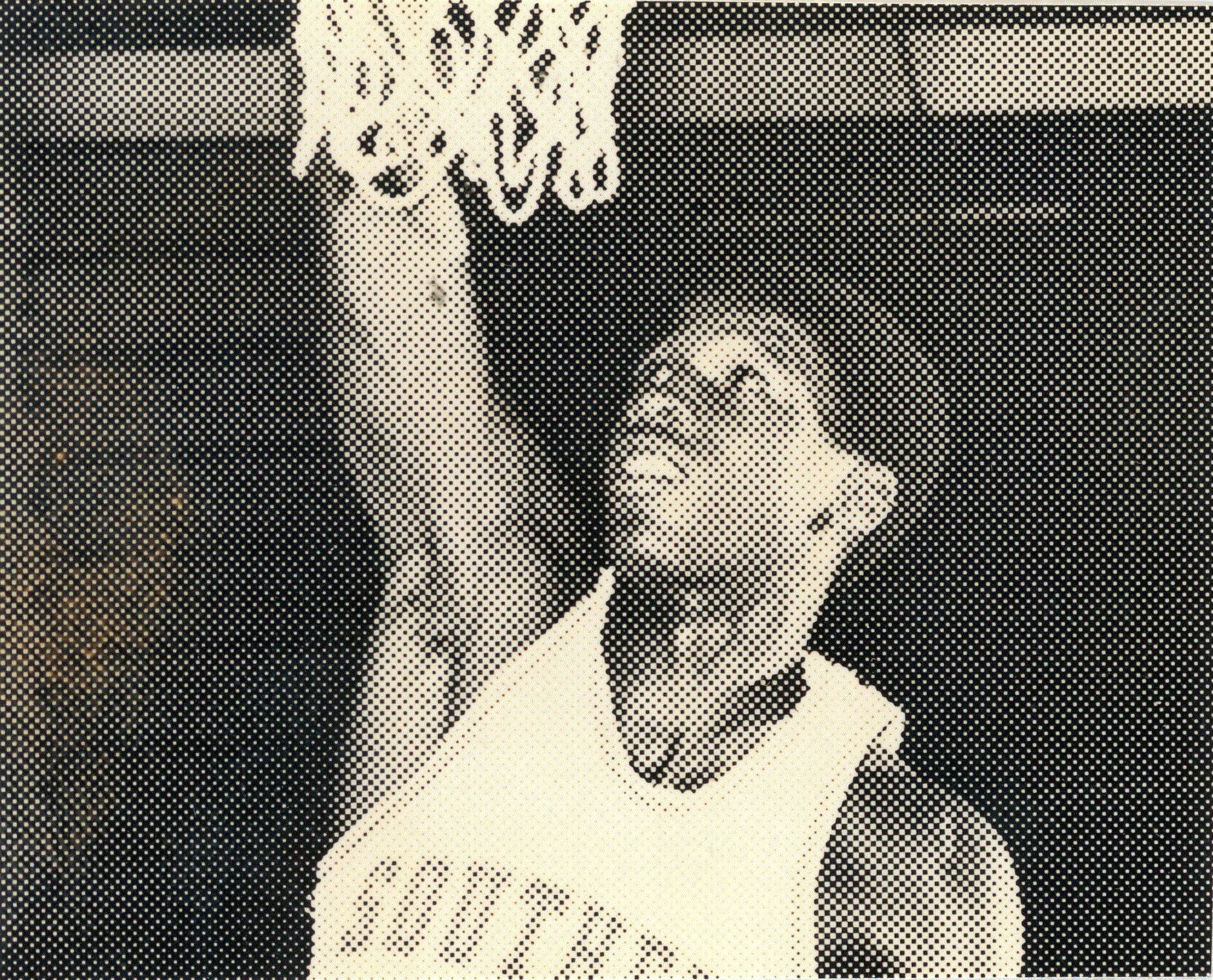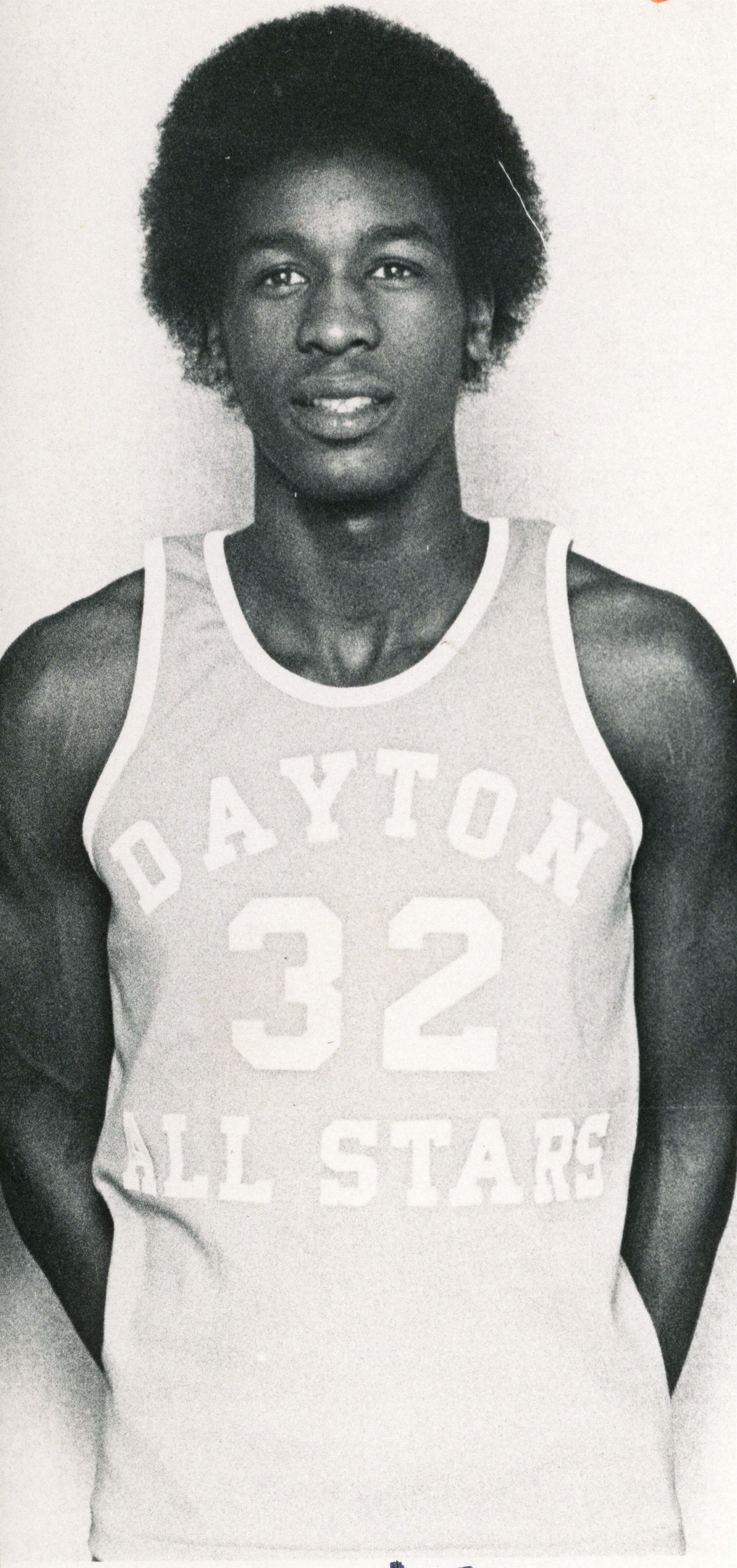He and Lasealle, his wife of 12 years, live in a modest, well-kept home in the Princeton Heights area of Dayton. He has two grandsons who are promising athletes at Trotwood Madison High School. He and his wife devote much of their time to their Jehovah’s Witnesses faith and helping others.
If you look around their nicely-appointed living room, you saw only on small reminder of his old self.
Propped on a shelf was a 3-by-5 photo of him dribbling down the court in his Southern University uniform: No. 45 on his chest, long white socks coming up his legs to just below his knees and that familiar face topped with a 1970s Afro.
When asked, he said it was the only photo he has left – that he’d lost the rest of his pictures – but then Lasealle gently corrected: “No, you’ve got a scrapbook back there with some photos in it.”
“Well, this one is the best,” he said quietly with a shrug.
These days he often distances himself from his past.
Last month Stivers enshrined the Tigers’ 1974-76 basketball teams into its athletic hall of fame. The 6-foot-6 Sanders was the star player from those glory days, but he didn’t attend the induction ceremony.
A few years ago, the Varsity Club Hall of Fame – which celebrates Dayton City Schools greats – honored him among others at a Salem Avenue restaurant. He didn’t show that time either.
Some of his former teammates – from the state tournament team at Stivers to fellow Southern players, three of whom also came from Dayton – have said they’ve had little contact with him over the years.
And while he still loves basketball and watches it on television at home, he said he hasn’t gone to high school games lately, even with his grandsons playing,
Part of it’s been due to the COVID pandemic and some of it is because of his work with Jehovah’s Witnesses, but there’s also a natural reclusiveness that’s shadowed him much of his life.
He masked it on the basketball court with a potent dose of talent and unabashed ego, the latter a false front for his off the court fears.
The reticence to current embrace has to do with that one letter.
Back in the day, he was Frankie J. Sanders, one of the greatest basketball players this city ever produced.
He was simply called Frankie J.
“The J stands for jump shot,” he beamed the other day.
And boy did he ever have one!
At Stivers, he averaged 22 points and 22 rebounds per game as a junior. As senior, he averaged 31.6 points per game. – the first time a City League player ever averaged over 30 in a season – and was named Ohio’s co-Player of the Year with Alter’s Jim Paxson in 1975.
In just three seasons at Southern, he scored over 2,000 points. Junior year, his 28.7 points per game average was third best in all of NCAA Division I basketball.
The San Antonio Spurs then picked him in the first round of the 1978 NBA draft.
While those were some of the most glorious times of his life, they also were some of the most mercurial, the most precarious and soon, the most self-destructive.
The ego that lifted him to great heights in a game tripped him up off the court.
Soon the expensive cars, the wasted money, the drugs and the alcohol didn’t just knock him out of basketball, they almost cost him his life.
High school hoops hero
Sanders grew up with his grandmother, Mittie Sanders, on Riegal Street near St. Elizabeth Hospital. He first played basketball on the nearby court at Edgemont Park.
Though living in the Dunbar area, he was bussed to Stivers and quickly became a hoops hero there.
“Off the court, I was an introvert,” he said. “I was like Clark Kent. But I turned into Superman when I got on the floor. It was the competition, the drive, the will. I don’t know, man, I was just vicious. I wanted those rebounds. I wanted to score and didn’t believe anybody could stop me.”
As a senior, he teamed with Eric Sutton, an equally high scorer, and they led the Tigers to the state championship game, where a late-game meltdown in regulation turned into an overtime loss to Warsaw River View.
By then, Sanders once told me, he already had an agent, a lawyer from Cincinnati, who looked out for certain players on the Q.T.
“He gave me money and paid my bills,” Sanders said. “He told me everything I wanted to hear: How I’d be a first round pick in the NBA. He was my mouthpiece. He put my name out there.”
He said a lot of colleges offered him something and when he chose Southern University, he got a yellow Cadillac.
“Sports was corrupt back then,” the 65-year-old Sanders said when we spoke again a few days ago.
“After the Cadillac, the next year, I had a (Mercury) Grand Marquis Brougham,” he said. “It was blue.”
Back then, Lasealle knew nothing of him.
She grew up in Lexington, Ky., was three years younger and had been a lifelong Jehovah’s Witness.
Since they married, she’s heard some of the stories though and that prompted her query:
“Oh blue. Was that the one that was metallic blue?”
“No,” Frankie said. “Metallic blue was the (Lincoln Continental Mark V) Diamond Jubilee, my first car in the NBA. Cost $40,000.”
When he headed to Southern for his big time ride into basketball, he was joined by three other Jaguar recruits from Dayton: Lionel Garrett, Robert Patterson and Robert Bradley.
During Sanders three-year college career, his cars – and there were three, he said, one for each year – were eclipsed by his play, like the night he scored 60 points against Dillard University. Over his three years, he averaged 26 points and 10 rebounds a game.
The Spurs made him the 20th overall pick, but the penchant for flash and excess by a rookie caused some of the team’s veterans – most notably George Gervin, The Iceman, who was on his way to a career of 12 All Star selections, 26,595 points and enshrinement in the Naismith Memorial Basketball Hall of Fame – tried to counsel him that he wasn’t in college.
That the pros were business.
Sanders paid no heed.
“I thought I was better than George Gervin,” he said quietly as he shook his head in disbelief. “Once again, it was ego.”
The Spurs waived Sanders during his rookie season, but the Boston Celtics quickly signed him to fill a void left by injuries to Tiny Archibald and Don Chaney.
Instead, he once told me Boston was where he discovered cocaine and crack.
When the Boston venture ended, there was a brief stop with the Indiana Pacers, who cut him in training camp. After a season off, he signed with the Kansas City Kings, where he appeared in nine playoff games. And then – after 69 games total – his NBA career was over.
He played in the CBA with the Ohio Mixers and Albany Patroons and overseas in Spain, France and Venezuela.
But his lifestyle and an injured disc in his back soon ended all of that.
It was something his late father, Willie Sanders, a longtime worker at Harrison Radiator, prophesied the first time Frankie J. returned to Dayton in is new Diamond Jubilee.
t
“‘He’s not focused.’”
Getting sober
One evening in the mid-1990s, I remember driving down Salem Avenue and spotting a tall guy tromping along the side of the road. He looked familiar, but was gaunt and glazed.
I turned around and came back. It was Frankie J. or at least what used to be him.
He was now a soulless shell, lost in every sense of the word and he didn’t want to talk.
“I was down to 160 pounds or so then,” he recalled the other day. “I’d hit bottom.”
Lasealle nodded: “He’s told me he wasn’t himself. That he’d even thought of suicide, but was too afraid to do it. Too embarrassed. He just felt lost.”
She was right. As he once put it, he’d lost his job, his wife…and his way.
It was a time when a few star athletes from that era in Dayton suffered similar fates.
“We were from the ‘hood, raised in poverty, and drugs were part of those neighborhoods,” he said. “We all could have been successful. We had the talent, but we got caught up in everything else.”
That’s the story line especially of the late Dwight Anderson.
“Dwight was the best we’ve ever seen in Dayton,” Sanders said. “He might have been the Michael Jordan before Michael. But his ego was worse than mine.
“Eventually the Board of Education called both of us in. We had been a couple of their best players – him a Roth, me at Stivers – and they said, ‘The two of you look awful. We want to send you to treatment. Do you want help?’
“I said, ‘Yes.’
“Dwight said ‘No.’”
Later, Anderson would get help – thanks to a few former players, first Cliff Pierce, and especially Sedric Toney and Eric Bradley – and made a Phoenix-like rise. He briefly coached in the area, made other societal contributions and reunited with his family. He died two years ago at age 59.
Sanders had gotten back on track more than a decade before Dwight.
“I’m coming up on my sobriety day,” he said quietly. “Since December 1, 1998.”
After that he said he committed himself to Jehovah’s Witnesses:
“The Jehovah’s organization really saved me. It taught me to be humble.”
And that set the stage for one of the greatest showcase moments of his life.
Finding love
Lasealle Dunn was part of the Lexington contingent that attended the national Jehovah’s Witnesses convention at the Nutter Center 14 years ago.
In a crowd of nearly 30,000, she spotted Frankie Sanders sitting with his two aunts, Gloria Sanders and Carol Phillips.
“Frankie was eight rows down on the other side of the steps,” she said with a stifled giggle. ‘He got up out of his seat and I happened to be looking that way and I said to myself: ‘Now, THAT’S what I’m talkin’ about!’
“It was just his appearance: The height, the looks, the eyes.
“He walked up the steps past me and we didn’t say anything. I knew I should have been paying attention to the convention, but when he sat back down, I was watching him. I was thinking, ‘If he’d just turn around.’
“And a little later he does turn and looked right at me and I looked away quick. Later, he turned again and I thought, ‘Well, he keeps turning,’ so I did like this.”
She held up her hand and wiggled a “Hello” with her fingers.
They stared mouthing words to each other and she finally said: “After...the…meeting.”
They met in the corridor, exchanged numbers and a few days later he called her in Lexington.
Eventually they dated and when they found out they both were committed Jehovah’s Witnesses – “We wanted to be evenly yoked,” Lasealle said – they married.
When they met she knew nothing of his basketball fame or the roller coaster ride that had followed. He eventually shared some of the stories and they came to the agreement that their marriage would work if he was Frankie Sanders, not Frankie J.
“Oh no, she wouldn’t have put up with Frankie J.,” he said. “She wouldn’t have dealt with that.”
Lasealle laughed: “We try to keep it at Frankie Sanders, but I know Frankie J. is in his blood, in his DNA. It’s like Dr. Jekyll and Mr. Hyde. When he’s Frankie J. now, he can be hard-headed and doesn’t listen. He can tune you out.
“So we try to redirect Frankie J. to the back burner. But Frankie Sanders is a different person and when he’s just Frankie, he’s my Frankie.”
That said, she sees how he perks up when he watches basketball on TV or talks about those games – whether it’s Stivers, Southern or the pros – from the past:
“You can just see it in his face. Hear it in his voice. He really lights up.”
Sanders said he doesn’t miss the headlines and the cheers: “No, that activates the Frankie J. personality. And right now I feel better about things than I ever did.
“I’m married to a good woman, a fine looking woman. We’re both committed to helping and giving back through our work as Jehovah’s Witnesses.
“I feel good about what I’m doing. I feel good about myself. I’m happier than I’ve ever been.”
All it took was losing a letter and finding a life.
About the Author



